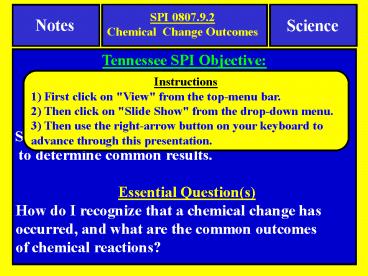Notes - PowerPoint PPT Presentation
1 / 13
Title:
Notes
Description:
SPI 0807.9.2 Chemical Change Outcomes Notes Science Tennessee SPI Objective: Identify the common outcome of all chemical changes. Instructions 1) First click on – PowerPoint PPT presentation
Number of Views:56
Avg rating:3.0/5.0
Title: Notes
1
SPI 0807.9.2 Chemical Change Outcomes
Notes
Science
Tennessee SPI Objective Identify the common
outcome of all chemical changes.
Instructions 1) First click on "View" from the
top-menu bar. 2) Then click on "Slide Show" from
the drop-down menu. 3) Then use the right-arrow
button on your keyboard to advance through this
presentation.
Essential Learning Students will examine chemical
change outcomes to determine common results.
Essential Question(s) How do I recognize that a
chemical change has occurred, and what are the
common outcomes of chemical reactions?
2
SPI 0807.9.2 Chemical Change Outcomes
Science
Notes
- Chemical Changes
- Occur when 2 or more substances, due to a
chemical reaction, form a compound change into
a new substance.
- Compounds are formed when you combine 2 or more
or more different reactive elements - Atomic bonds break apart and new atomic bonds are
formed - Valence Electrons are transferred or shared
- (F.Y.I. This is called ionic covalent bonding)
- .so in other words
- chemical changes, chemical bonding and chemical
reactions are all connected - Chemical bonding occurs during a chemical
reaction resulting in a chemical change
3
Just F.Y.I. Chemical Reaction due to Ionic
Bonding-bond formed by electron transfer
("stealing") -forms a compound called NaCl (table
salt)
4
Just F.Y.I Chemical Reaction due to Covalent
Bonding-bond formed by sharing of
electrons -Forms a diatomic molecule called N2
Notes
5
SPI 0807.9.2 Chemical Change Outcomes
Science
Notes
- Compounds
- Compounds are formed from chemical reactions
Memory Trick C C (chemical reactions
compounds)
Example When two hydrogen atoms react with one
oxygen atom you produce (form) the compound
called water (H2O).
H
Oxygen
H
6
SPI 0807.9.2 Chemical Change Outcomes
Science
Notes
5 Key Points About All Chemical Reactions
1) A new substance is created
2) The properties of the new substance are
different from the substances that you started
with
3) No atoms are created or destroyed during
chemical reactions
4) Atomic bonds are broken and new bonds are
formed (at the valence electron level)
5) compounds come from chemical reactions
7
SPI 0807.9.2 Chemical Change Outcomes
Science
Notes
Memory Trick Chemical reactions can H.O.P.E.
Chemical Change Indicators-Memory
Trick H.O.P.E. H Heat-Heat may be given off (it
may get hot) O Odor-There may be a change in
odor (how it smells) P Pop-It may pop or bang
(make a loud noise) E Explode-It may explode
(like fire crackers or dynamite)
8
SPI 0807.9.2 Chemical Change Outcomes
Science
Notes
Memory Trick Chemical reactions can 4FPC
Chemical Change Indicators-Memory Trick 4FPC F
Foam-It may foam (like vinegar baking soda) F
Flash-It may flash (like a grenade or gun
powder) F Fizzle-It may fizzle (make a hissing
sound like Alka-Seltzer) F Flame- It may burn
(like burning paper or wood) P Precipitate-It
may form a solid substance (called a precipitate)
C Color- It may change color (red to blue,
green to orange, etc.)
9
SPI 0807.9.2 Chemical Change Outcomes
Science
Questions
Sample Question
Here is an example of a question you might see on
a quiz or test.
10
SPI 0807.9.2 Chemical Change Outcomes
Science
Questions
Sample Question
Here is an example of a question you might see on
a quiz or test.
11
SPI 0807.9.2 Chemical Change Outcomes
Science
Questions
Sample Question
Here is an example of a question you might see on
a quiz or test.
12
SPI 0807.9.2 Chemical Change Outcomes
Science
Questions
Sample Question
Here is an example of a question you might see on
a quiz or test.
13
SPI 0807.9.2 Chemical Change Outcomes
Science
Questions
Sample Question
Here is an example of a question you might see on
a quiz or test.































